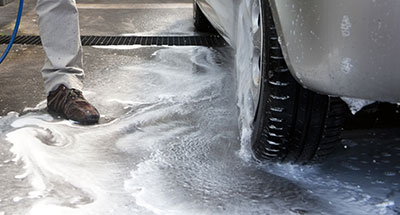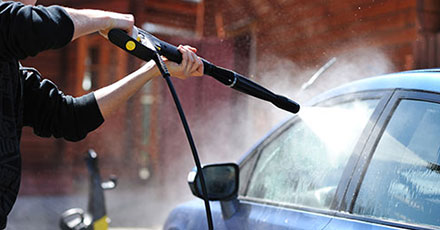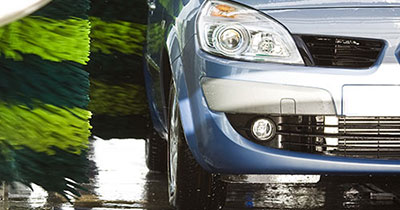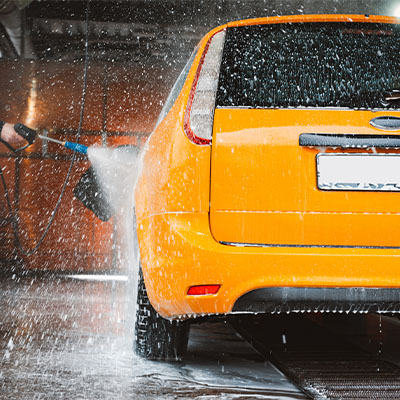 Cars are important assets that need to be cared for. However, heading to your driveway with a sponge and a bucket to wash your vehicle may not be the best option.
Cars are important assets that need to be cared for. However, heading to your driveway with a sponge and a bucket to wash your vehicle may not be the best option.
What many people don’t realise is that washing cars at home can result in heavily polluted water flowing into stormwater systems and contaminating water bodies.
On the other hand, a regulated commercial car wash will save you time and energy – as well as help the environment.
Clearwater's single-minded focus is on helping businesses and individuals keep our water clean. This includes protecting storm drains and local waterways. For more information, get in touch with our expert team, or read through more of our handy resources.
How Does Car Washing Affect The Environment?
Research has shown that over 13 Gigalitres of contaminated wastewater are being directed into stormwater systems across Australia each year due to uncontrolled vehicle washing on hard surfaces.
You may be wondering whether car wash soap is bad for the environment. The truth is, What seems like just soap and water flowing down the drain is far more serious when you consider the large number of cars that are washed at home in urban areas – particularly over an extended period of time.
Your car wash water is contaminated with more than just detergent and mud and creates high levels of car wash pollution. Other contaminants in the wash water include:
- Petroleum hydrocarbons and Volatile Hydrocarbons;
- Heavy metals;
- Nutrients such as phosphorus and nitrogen;
- Surfactants and suspended solids.
These products of your car wash flow via the stormwater drainage system into the nearest river, creek or ocean, presenting a danger to aquatic life and resulting in long-term consequences.
Non-Polluting and Cost-Effective Car Wash Alternatives
 Wastewater treatment and water recycling solutions have recently gained momentum in Australia, with the acknowledgment of water as a precious and scarce resource.
Wastewater treatment and water recycling solutions have recently gained momentum in Australia, with the acknowledgment of water as a precious and scarce resource.
Commercial car washes are required to comply with water authority and council regulations, which set strict requirements for wastewater disposal. These requirements are put in place to protect urban stormwater systems and Australia’s rivers, creeks, lakes and oceans.
It’s not just good for the environment, however. With the rising costs of water, wastewater treatments and water recycling systems have also become a more cost-effective option for commercial car washes.
These days, car washes use very little mains water. Instead, fine nozzles and high-pressure hoses are linked to water recycling systems that reclaim water from wash bays.
It has been estimated that, on average, a single car wash will use the same amount of water as washing one load of clothes in the washing machine or a five minute shower.
Car wash equipment to address wastewater treatment and water recycling is available for manual, self-serve, tunnel system, and touch-free car washes.
Some of the systems car washes utilise to achieve responsible water practice include:
- Oil water separators;
- Rain water harvesting systems;
- First flush diversion systems, and;
- pH control systems.
These water treatment and recycling solutions can save commercial car washes up to 80% of their water costs, resulting in the sustainable use of resources, water efficiency, and greater profitability to keep your car clean.
Are Car Washes Bad For Your Car?
While you like the idea of preventing car wash pollution by visiting a local car wash, you may be wondering what’s best for the state of your vehicle. It’s important to understand that washing your car at home doesn’t necessarily mean your car will be in better condition. Even if you use a spray bottle and other specialised car cleaning equipment, harmful chemicals will still be used to clean the entire car - which could damage the car’s paint.
Using a commercial car wash ensures your car is being cleaned in an environmentally friendly manner that is safe for both the car and the local sewerage system.
Water Treatment & Water Recycling for Compliance
 Car wash equipment can attain a high quality of recycled water by including a disinfection process in the cycle. It is also important that the car wash uses only biodegradable soap and quick-break degreasers and detergents. Ultimately, the water discharged into the sewer system must comply with the Trade Waste Guidelines.
Car wash equipment can attain a high quality of recycled water by including a disinfection process in the cycle. It is also important that the car wash uses only biodegradable soap and quick-break degreasers and detergents. Ultimately, the water discharged into the sewer system must comply with the Trade Waste Guidelines.
With care being taken by commercial car washes to remain authority compliant and eco-friendly, enlisting their services to wash your vehicle is worthwhile.
Remember: every individual who makes a decision to use a regulated car wash is making a difference to the environment and contributing to a cleaner, greener Australia.
Understanding Compliance for Wash Bays
At Cleanawater, we aim to reduce the amount of pollution and dirty water that seeps into a storm drain when a car is washed. Therefore, while it’s critical that an individual chooses to wash their car using a commercial cash wash, it is also important that this commercial business follows wash bay compliance guidelines. This applies to all wash bays, including permanent, portable and quarantine facilities.
We can help you understand recycling and water usage guidelines for the following:
- Bus wash bays
- Car wash bays
- Equipment and heavy machinery wash bays
- Caravan/RV wash bays
- Truck wash bays

For more information on sustainable and responsible water use, contact Cleanawater.
Must Read
VapourGard: Your ultimate odour control solution
Control odours effectively and safely with CleanaWater's VapourGard system. Ideal for industries such as mining, landfill operations, recycling, and more, the VapourGard system uses lightweight partic ...
Read moreControl Odour with VapourGard
Control odours effectively and safely with CleanaWater's VapourGard system. Ideal for industries such as mining, landfill operations, recycling, and more, the VapourGard system uses lightweight partic ...
Read more